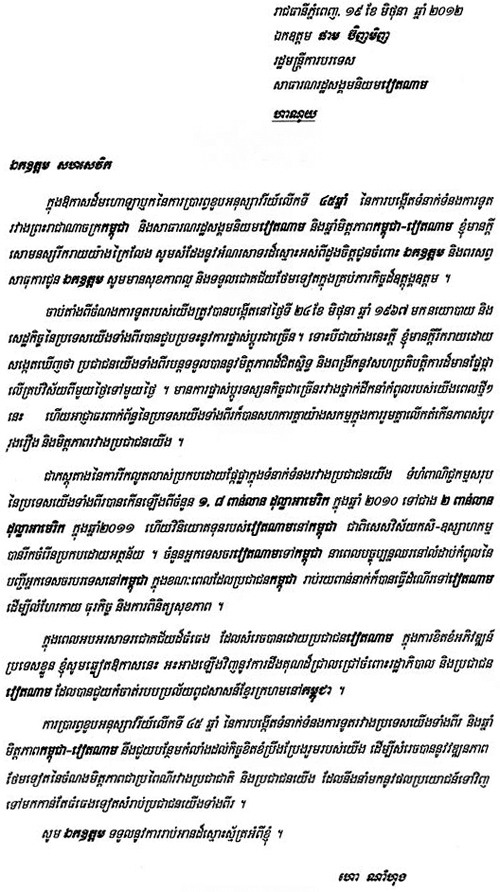កំពត-កៀងយ៉ាង ៖ នៅពេលព្រឹកព្រលឹមថ្ងៃទី ២៤ មិថុនា នាយករដ្ឋមន្រ្តី កម្ពុជា-វៀតណាមបានបង្ហាញវត្តមាននៅឯព្រំដែនប្រទេសទាំងពីរខេត្តកំពត-កៀងយ៉ាង ដើម្បី សម្ពោធបង្គោលព្រំដែនលេខ ៣១៤ ដែលជាការសម្ពោធបង្គោលព្រំដែនលើកទី២ បន្ទាប់ពីសមភាគីទាំងពីរបានសម្ពោធបង្គោលព្រំដែន លេខ ១៧១ នៅច្រកទ្វារព្រំដែនអន្តរជាតិបាវិត-ម៉ុកបាយកាលពីឆ្នាំ២០០៦ នោះ។ បង្គោលព្រំដែន លេខ ៣១៤ ជាបង្គោលចុងក្រោយបង្អស់ នៃខ្សែព្រំដែនគោកកម្ពុជា-វៀតណាម នៅចំណុចឆ្នេរសមុទ្រ ខេត្តកំពត និង កៀងយ៉ាង ។
ពិធី
សម្ពោធការបោះបង្គោលព្រំដែននេះ ចំពេលជាមួយគ្នា
និងថ្ងៃខួបអនុស្សាវរីយ៍លើកទី ៤៥ ឆ្នាំ
នៃការបង្កើតទំនាក់ទំនងការទូតរវាងប្រទេសយើងទាំងពីរ(២៤មិថុនា១៩៦៧ -២៤ មិថុនា២០១២) ដែល
នាយករដ្ឋមន្រ្តីកម្ពុជាបានកត់សម្គាល់ថា
យើងមាននិមិត្តរូបពីរសម្រាប់ប្រទេសទាំងពីរ
ដែលខ្ញុំសូមយកឱកាសនេះ
ឧទ្ទិសពិធីសម្ពោធការបោះបង្គោលព្រំដែនកម្ពុជា-វៀតណាម
លេខ៣១៤ ឱ្យ ក្លាយទៅជាយន្តការប្រកៀកស្មាគ្នា
ក្នុងស្មារតីភាតរភាពជាអមតៈ និងការបង្កើតនូវកិច្ចអភិវឌ្ឍគ្រប់
វិស័យនៅតាមខ្សែបន្ទាត់ព្រំដែននៃប្រទេសទាំងពីរ ។
សម្តេច
អគ្គមហាសេនាបតីតេជោ ហ៊ុន សែន និងឯកឧត្តម ង្វៀន តាន់យុង
នាយករដ្ឋមន្រ្តីនៃ
សាធារណរដ្ឋសង្គមនិយមវៀតណាមបានសម្តែងនូវការកោតសរសើរ
និងវាយតម្លៃខ្ពស់ចំពោះគណៈ កម្មការចម្រុះខណ្ឌសីមា
និងបោះបង្គោលព្រំដែនគោកវៀតណាម-កម្ពុជា
ដែលបានខិតខំប្រឹងប្រែង
ធ្វើឱ្យការងារបោះបង្គោលព្រំដែនបានប្រព្រឹត្តទៅដោយរលូន
និងមានការទទួលស្គាល់ពេញលក្ខណៈ ផ្លូវច្បាប់នោះ។ សម្តេចតេជោ ហ៊ុន
សែន មានប្រសាសន៍ថា ក្នុងនាមរាជរដ្ឋាភិបាលកម្ពុជា
ខ្ញុំពិតជាមានមោទនភាព
ដោយប្រទេសយើងទាំងពីរខិតខំទម្លុះបាននូវការលំបាកទាំងឡាយ
ក្នុងការកសាងព្រំ ដែនរវាងប្រទេសយើងទាំងពីរ។«ខ្ញុំ
សូមប្រកាសជាឱឡារិកថា កិច្ចការកសាងព្រំដែននេះគឺបានអនុវត្ត
ដោយឈរលើមូលដ្ឋានច្បាប់ជាតិ និងច្បាប់អន្តរជាតិ
និងការអនុវត្តជាអន្តរជាតិស្តីពីការទទួលស្គាល់ ខ្សែព្រំដែន
ដែលឤណានិគមបារាំងបានបន្សល់ទុកឱ្យសម្រាប់ធ្វើជាឧបករណ៍នាំមុខ
ដើម្បីឈានទៅដល់ការបញ្ចប់ទាំងស្រុងលើការងារខណ្ឌសីមា
និងបោះបង្គោលព្រំដែនគោករវាងប្រទេសទាំងពីរ» ។
បង្គោល
ព្រំដែនលេខ ៣១៤ មានសារៈសំខាន់ណាស់ដោយទីតាំងបង្គោលនេះ ជាចំណុចមូល
ដ្ឋាននៃការចាប់ផ្តើមគូសខ្សែព្រំដែនសមុទ្ររវាងប្រទេសទាំងពីរ
ដែលជាភារកិច្ចរបស់គណៈកម្មការ
ចម្រុះព្រំដែននៃប្រទេសទាំងពីរត្រូវអនុវត្តបន្តនាពេលខាងមុខនេះ។
កម្ពុជាមានគោលដៅបន្តឆ្ពោះទៅ
បោះបង្គោលព្រំដែនទឹកបន្ថែមទៀតដោយចាប់ផ្តើមពីការតភ្ជាប់តំបន់
ព្រំដែនគោកនៃប្រទេសទាំងពីរ។ សម្តេចតេជោថ្លែងថា ខ្ញុំជឿជាក់ថា
ប្រទេសយើងទាំងពីរនឹងសម្រេចបាននូវការបោះបង្គោលព្រំដែន
ទឹកមួយពេញលេញ គ្មានលម្អៀង ដោយឈរលើគោលការណ៍នៃច្បាប់
និងក្របខណ្ឌគតិយុត្តិអន្តរជាតិ
ហើយអ្វីដែលយើងទាំងអស់គ្នាសម្រេចបានមកនេះបានបង្កើតជា
ប្រវត្តិសាស្ត្រថ្មីមួយ រវាងប្រទេសយើងទាំងពីរ
ខណៈដែលយើងតែងបានស្វះស្វែងរកដំណោះស្រាយរួមមួយប្រកបដោយភាតរភាព
និង ការយោគយល់គ្នាទៅវិញទៅមកក្នុងភាពជាបងប្អូន ជាមិត្ត
អស់រយៈកាលរាប់សិបឆ្នាំកន្លងមក» ។
សម្តេច
តេជោមានប្រសាសន៍ថា
ជាការពិតប្រសិនបើយើងមិនប្រឹងប្រែងបោះបង្គោលព្រំដែន
ទេនោះបញ្ហាព្រំដែននេះនឹងនៅតែកើតមានមិនដាច់ស្រេចរាប់ជំនាន់ទៅ
មុខទៀត ដោយសារបញ្ហានេះ
ជាចំណុចរសើបងាយក្លាយជាកម្មវត្ថុប្រជែងផ្នែកនយោបាយ
ដែលដូច្នេះហើយភាពសុខសាន្ត និងការ
អភិវឌ្ឍន៍នៅតាមព្រំដែននឹងមិនកើតមានឡើយ ។
សម្តេចនាយករដ្ឋមន្រ្តីមានប្រសាសន៍ថា ជាការពិត
ការសម្ពោធបង្គោលព្រំដែនលេខ ៣១៤ នាពេលនេះពុំមានន័យថា
ជាការសម្ពោធការចាប់ផ្តើមបោះបង្គោល
ហើយក៏មិនមែនជាការសម្ពោធបញ្ចប់ការងារបោះបង្គោល
និងខណ្ឌសីមាព្រំដែនរវាងប្រទេស យើងទាំងពីរទាំងស្រុងនោះទេ
ពីព្រោះយើងនៅមានការងារសេសសល់មួយចំនួនទៀត ដែលត្រូវបន្ត
អនុវត្តរហូតដល់កិច្ចការទាំងអស់ត្រូវបានបញ្ចប់ជាស្ថាពរនាពេលខាង
មុខនេះ។ សម្តេចតេជោថ្លែងថា ជារួមកិច្ចការបោះបង្គោលព្រំដែននេះ
មិនត្រឹមតែរួមចំណែកយ៉ាងសំខាន់ដល់កិច្ចការបូរណភាព
ដែនដីនៃប្រទេសនីមួយៗនៅជិតខាងគ្នាឱ្យបានកាន់តែរឹងមាំប៉ុណ្ណោះ
ទេ ប៉ុន្តែថែមទាំងរួមចំណែកដល់ ការបង្កើនសុខសន្តិភាព
ការជំរុញកំណើនសេដ្ឋកិច្ច ការអភិវឌ្ឍសង្គម
ការលើកកម្ពស់ជីវភាពរស់នៅ និង
ការកាត់បន្ថយភាពក្រីក្ររបស់ប្រជាជនទៀតផង ។
ឯកឧត្តម
នាយករដ្ឋមន្រ្តីវៀតណាមថ្លែងថា នេះជាលើកទី២ ដែលរូបខ្ញុំផ្ទាល់
និងសម្តេចហ៊ុន សែន បានរួមគ្នាក្នុងពិធីសម្ពោធបង្គោលព្រំដែន
ដែលប្រការនេះបានឆ្លុះបញ្ចាំងឲ្យឃើញយ៉ាងច្បាស់ នូវកិច្ចសន្យា
និងការប្តេជ្ញាចិត្ត និងការខិតខំរបស់រដ្ឋាភិបាល
នៃប្រទេសទាំងពីរក្នុងការអនុវត្តន៍រាល់ សន្ធិសញ្ញា កិច្ចព្រមព្រៀង
និងរាល់កិច្ចចរចាស្តីពីការងារព្រំដែន
ដើម្បីភាគីទាំងពីរមានលទ្ធភាពធ្វើការងារដ៏មានសារៈសំខាន់ឲ្យបាន
ចប់សព្វគ្រប់នៅពេលដ៏ឆាប់បំផុត។ ឯកឧត្តម ង្វៀន តាន់យុង
មានប្រសាសន៍ថា ពិធីសម្ពោធបង្គោលព្រំដែនលេខ ៣១៤
ជាព្រឹត្តិការណ៍នេះគូសបញ្ជាក់សារជាថ្មីនូវជ័យជំនះរួមរបស់ប្រទេស
យើងទាំងពីរ
ប្រជាជនទាំងពីរក្នុងកិច្ចចូលរួមគ្នាកសាងខ្សែបន្ទាត់ព្រំដែនមួយ
សន្តិភាព មិត្តភាព
សហការគ្នាក្នុងការអភិវឌ្ឍន៍ឆ្លើយតបផលប្រយោជន៍ជាសារវន្ត
ក៏ដូចជាបំណងប្រាថ្នារបស់ប្រជាជនប្រទេសទាំងពីរ។ ទន្ទឹមនោះ
ក៏ជាការកកើតឡើងនូវកម្លាំងថ្មីដែលប្តេជ្ញាធ្វើឲ្យចប់
ការងារខ័ណ្ឌសីមា និងបោះបង្គោលព្រំដែនគោកក្នុងពេលឆាប់បំផុត។
ឯកឧត្តម
ង្វៀន តាន់យុង មានប្រសាសន៍ថា ពិធីសម្ពោធបង្គោលព្រំដែនលេខ ៣១៤
នេះបានបង្កើតភាពអនុគ្រោះក្នុងទំនាក់ទំនងរវាងគ្នា
សហប្រតិបត្តិការអភិវឌ្ឍសេដ្ឋកិច្ច និងនាំមកនូវស្ថិរភាព
មិនត្រឹមតែសម្រាប់ប្រជាជននៅខេត្តកំពត និងខេត្តកៀងយ៉ាងនោះទេ
ប៉ុន្តែវាកាន់តែរួមចំណែកក្នុងការ ជម្រុញទំនាក់ទំនងមិត្តភាព
សហប្រតិបត្តិការលើគ្រប់វិស័យ ពិសេសលើផ្នែកសេដ្ឋកិច្ច ពាណិជ្ជកម្ម
ទេសចរណ៍ និងវិនិយោគរវាងបណ្តាខេត្តនៅជាប់ខ្សែព្រំដែន
នៃប្រទេសទាំងពីរទៀតផង។ ឯកឧត្តម នាយករដ្ឋមន្រ្តីថ្លែងបន្តថា
តាងនាមឲ្យរដ្ឋាភិបាល នៃសាធារណរដ្ឋសង្គមនិយមវៀតណាម
ខ្ញុំសូមថ្លែងអំណរគុណយ៉ាងជ្រាលជ្រៅជូនសម្តេចតេជោនាយក
រដ្ឋមន្រ្តីនៃព្រះរាជាណាចក្រកម្ពុជា និងបណ្តាមិត្ត កម្ពុជា
ដែលបានសហការយ៉ាងស្អិតរមួតជាមួយភាគីវៀតណាមយើងខ្ញុំនៅក្នុង
ការងារនេះ។ រដ្ឋាភិបាល
វៀតណាមសូមវាយតម្លៃខ្ពស់ចំពោះកិច្ចខិតខំប្រឹងប្រែងរបស់
គណៈកម្មការចម្រុះខណ្ឌសីមា និងបោះបង្គោលព្រំដែននៃប្រទេសទាំងពីរ
បណ្តាក្រសួង ស្ថាប័ន អាជ្ញាធរមូលដ្ឋាននៃភាគីទាំងពីរនិយាយរួម
បណ្តាអង្គភាពមានការពាក់ព័ន្ធនៃខេត្តកៀងយ៉ាង និងខេត្តកំពត
និយាយដោយឡែក
ដែលបានរួមចំណែកយ៉ាងធំធេងក្នុងការអនុវត្តន៍ការងារខណ្ឌសីមា
និងបោះបង្គោលព្រំដែន។
ឯកឧត្តម
ង្វៀន តាន់យុង បានកត់សម្គាល់ថា
នៅចំពោះមុខដើម្បីសម្រេចការងារខណ្ឌសីមា និង បោះបង្គោលព្រំដែន
ភាគីទាំងពីរនៅមានការងារជាច្រើនដែលត្រូវធ្វើ
ខ្ញុំសូមស្នើគណៈកម្មការ ចម្រុះខណ្ឌសីមា
និងបោះបង្គោលព្រំដែននៃប្រទេសទាំងពីរបន្តការខិតខំ
សហប្រតិបត្តិការឲ្យបានស្អិតរមួតក្នុងការអនុវត្តន៍ភារកិច្ច
សំដៅធ្វើឲ្យខ្សែព្រំដែននៃប្រទេសយើងទាំងពីរក្លាយជាខ្សែព្រំដែន
សន្តិភាព ស្ថិរភាព និងសុខដុមរមនា។
សម្តេច
តេជោថ្លែងថា បង្គោលព្រំដែនដែលប្រទេសយើងទាំងពីរ
បាននិងកំពុងធ្វើនេះ មិនត្រឹមតែជាកិច្ចការរួមធ្វើឡើង
ដើម្បីសម្គាល់ការខណ្ឌចែកទឹកដីរវាងព្រះរាជាណាចក្រកម្ពុជាជា
មួយនឹងសាធារណរដ្ឋសង្គមនិយមវៀតណាមប៉ុណ្ណោះទេ
ប៉ុន្តែថែមទាំងជាការឆ្លើយតបទៅនឹងបំណង
ប្រាថ្នារបស់ប្រជាជននៃប្រទេសទាំងពីរ
ដែលបានរង់ចាំលទ្ធផលនេះជាយូរណាស់មកហើយផងដែរ។
ចំពោះមុខរាជរដ្ឋាភិបាលកម្ពុជា
និងរដ្ឋាភិបាលវៀតណាមនឹងខិតខំពុះពារគ្រប់ឧបសគ្គទាំងអស់ធ្វើឱ្យ
ប្រទេសយើងទាំងពីរមានខ្សែព្រំដែនសមស្របជាព្រំដែនអន្តរជាតិ
សម្រាប់ជាតិមាតុភូមិនៃយើងទាំងអស់គ្នាតរៀងទៅ
និងដើម្បីឱ្យប្រទេសយើងទាំងពីរមានខ្សែព្រំដែនមួយច្បាស់លាស់
ស្តែងឡើង ដោយបង្គោលព្រំដែន
ដោយប្រែក្លាយខ្សែព្រំដែនដែលមានតែនៅលើផែនទីឱ្យទៅ
ជាបង្គោលព្រំដែន នៅលើដីជាក់ស្តែង។
ព្រមជាមួយនេះនៅពេលដែលការងារបោះបង្គោល
និងខណ្ឌសីមាព្រំដែនត្រូវបានធ្វើរួចរាល់ហើយ គឺខ្សែព្រំដែននេះ
ត្រូវដើរស្របគ្នាទៅនឹងការកាន់កាប់ជាក់ស្តែងរបស់ប្រជាជន
ដែលរស់នៅតាមបណ្តោយព្រំដែន ហើយប្រែក្លាយព្រំដែនកម្ពុជា-វៀតណាម ឱ្យទៅជាព្រំដែនសុខ សន្តិភាព មិត្តភាព សហប្រតិបត្តិការ និង ការអភិវឌ្ឍលើគ្រប់វិស័យ។
សម្តេចនាយករដ្ឋមន្រ្តីមានប្រសាសន៍ថា ជារួមខ្សែព្រំដែនកម្ពុជា-វៀត
ណាមប្រវែង ១២៧០ គីឡូម៉ែត្រ ដែលត្រូវបោះបង្គោលព្រំដែនចំនួន ៣៧៥
បង្គោល នេះមិនត្រឹមតែបានឆ្លើយតបដល់ការ
ជំរុញកិច្ចសហប្រតិបត្តិការ និង ការអភិវឌ្ឍន៍
ប្រទេសក្នុងមហាអនុតំបន់មេគង្គប៉ុណ្ណោះទេ ប៉ុន្តែថែម
ទាំងរួមចំណែកបង្កើនកិច្ចសហការល្អក្នុងចំណោមប្រជាជាតិឤស៊ីអាគ្នេយ៍
ដើម្បីប្រែក្លាយខ្លួនស្រប តាមបាវចនា «ឤស៊ាន៖ សហគមន៍តែមួយ-វាសនាតែមួយ» ដែល
ជាមហាគ្រួសារជិតស្និទ្ធមួយ ដែល មានភាពសុខដុមទាំងផ្នែកនយោបាយ
សន្តិសុខ សេដ្ឋកិច្ច និង សង្គម វប្បធ៌ម
ដោយឈរលើគោលការណ៍វិធាននៃច្បាប់ សុខសន្តិភាព និង
ភាពរឹងមាំផ្នែកសេដ្ឋកិច្ចទៀតផង៕














